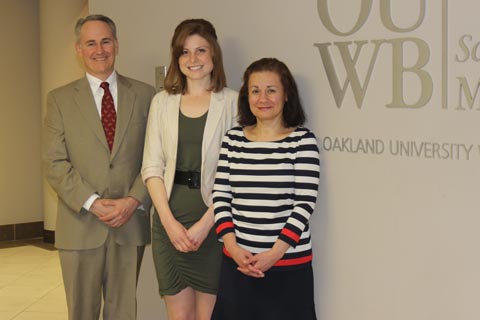
According to The Centers for Disease Control and Prevention, stroke is the fourth leading cause of death in the United States. The CDC reports that stroke kills almost 130,000 Americans each year and costs the U.S. more than $36 billion annually in treatment costs and time off from work. It’s estimated that an American dies from stroke every four minutes.
 |
| Mentors Dr. Charles Shanley (left) and Dr. Samia Ragheb (right) will work with second-year medical student Rachel Hanke as she researches biomarkers for stroke during her Capstone project. |
Hanke explained that, in some cases, a stroke is caused when unstable plaque in the carotid artery breaks into fragments that can block the blood supply to the brain. Her research will analyze blood and plaque samples of patients with Carotid Atherosclerosis in an effort to identify biological markers linked to patients who have unstable plaque. Those findings could lead to development of a simple blood test to help doctors identify high-risk patients before complications arise.
“The biological markers we are looking at are involved in vascular inflammation, and we are hoping to identify the inflammatory biomarkers that correlate with unstable plaques,” Hanke said. “The cost of biomedical research can be prohibitive, and there are not many funding opportunities for medical students who are interested in cutting-edge projects like this. The Seed Grant Research Program from the AMA Foundation allows students like myself to explore more challenging research.”
Hanke’s project is part of a Capstone experience designed to engage students in collaborative research with OUWB basic science and clinical faculty. Her team of mentors includes Samia Ragheb, Ph.D., assistant professor of biomedical sciences and Charles Shanley, M.D., FACS, professor of surgery and a vascular surgeon at Beaumont Health System.
Dr. Shanley believes Hanke's research holds tremendous promise in the search for biomarkers and novel therapeutic targets in human atherosclerosis. He said the medical school is uniquely positioned to provide students with unique “translational” research opportunities. Translational research involves scientific discoveries that can be used to enhance human health and well-being.
| It’s estimated that an American dies from stroke every four minutes. |
”The Capstone program underscores the synergies to be realized through the unique combination of Beaumont’s large clinical and translational research platform with OU’s state of the art educational infrastructure and basic science expertise,” he explained.
Dr. Ragheb praises Hanke not only for earning the grant, but also for taking on such a demanding project amid the rigors of medical school.
“It's not very common for a second-year medical student to win a grant like this,” Dr. Ragheb said. “The Seed Grant Research Program from the AMA Foundation is intended to support research by medical students, physician residents and fellows. Rachel was competing with residents and fellows who are more advanced in their studies, and also with students from medical schools all over the country,” she said. “Considering the intensity of medical school just makes Rachel's achievement even more remarkable.”
For more information on the Oakland University William Beaumont School of Medicine, visit oakland.edu/medicine.